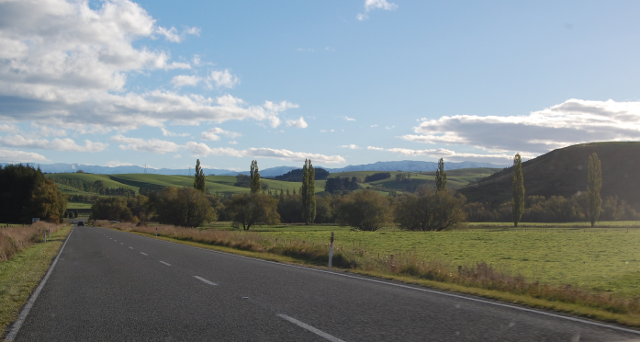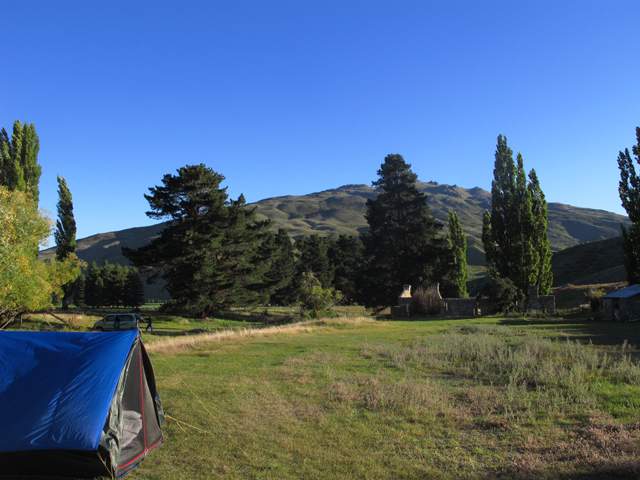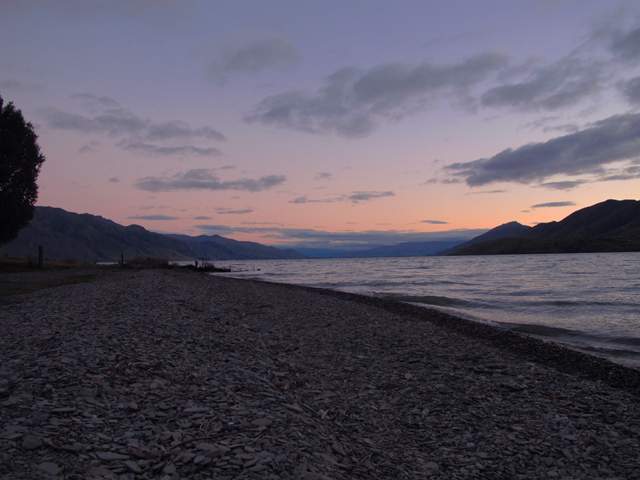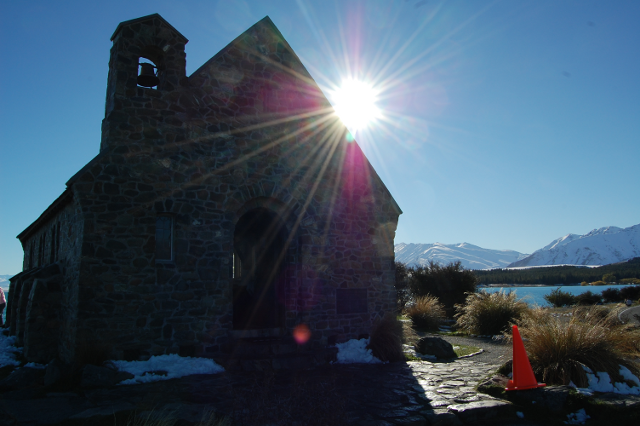One of the best parts of taking a road trip is the ability to camp outside of town. Imagine setting up a tent with the beach only steps away, or being surrounded on all sides by lush green mountains dotted with sheep.
Taking a road trip is the best way to explore the unique landscapes of New Zealand, as you’ll be up front with nature as well as be free to create your own path. There are a plethora of camping options to choose from – some are full service holiday parks with kitchens and TVs while others are inexpensive campgrounds cared for by the New Zealand Department of Conservation.
New Zealand’s many awe-inspiring attractions are spread out over both main islands, which means there will be lots of time spent in transit. Buses and domestic flights will work, but nothing compares to the freedom you’ll feel driving the coastal roads and mountain passes in your own vehicle. You’ll be in control of your itinerary and able to make spontaneous choices without worrying about some tour guide’s plans.
Renting a campervan is a popular choice of vehicle for road trippers as it offers not only independent transportation around the islands but doubles as a small house. It’s a turnkey option that doesn’t require a huge amount of preparation or thinking. However, for some travelers it is worth considering renting a regular car instead.
It’s a more rustic option and not as easy as a campervan, but there are many benefits that would improve both your travel experience as well as keep your travel costs in check.
Why rent a car instead of a campervan?

Cost: For a lot of travelers, this is an all-important consideration. And as is true everywhere, smaller vehicles demand smaller rental fees, and in New Zealand, the price difference between a regular sedan and a campervan is considerable. Don’t forget that campervans will require more fuel, and hence more money, to run. Another bummer is that smaller campervan models can’t plug into powered sites, requiring the engine for nighttime electricity usage.
Ease: If you’ve never driven a van or if you’ve never driven on narrow, windy mountain roads, a road trip of a couple hundred kilometers might not be the best time to start doing both at once. With a car, you’ll have an easier time navigating around sharp curves, especially on the opposite side of the road (Americans take note!). When driving through any New Zealand town or city, a normal car also offers a bit of anonymity where as a bright painted campervan will scream “tourist.” This extra security is a nice piece-of-mind as you’ll have all of your travel possessions in the vehicle.
There’s no better way to connect with nature than sleeping outside, in the cool night breeze, in a tent under the stars.
Connection to nature: Honestly, you aren’t traveling all the way to New Zealand to spend your time indoors. You should spend as much time as is possible exploring and enjoying the amazing terrain. There’s no better way to connect with nature than sleeping outside, in the cool night breeze, in a tent under the stars. Though in a campervan you’ll have easy access to a bed, realize you are still sleeping many hours each night inside a van. You will need camping gear if you choose to car camp; however, the experience of waking up in the New Zealand countryside with a tent full of fresh air is one you won’t want to miss.
What you’ll need for a car camping road trip

As you’ll be sleeping outside of your vehicle, some important gear is required. If you are unable bring this from home, New Zealand’s budget friendly and cleverly named warehouse superstore, The Warehouse, has plenty of inexpensive camping gear available to purchase. There are stores all over the country, so it doesn’t matter where your journey starts, you’ll be able to find what you need anywhere (check out The Warehouse’s website for more information).
Here is a suggested list of camping equipment:
- Tent with rain cover
- Tarp
- Mallet or hammer (for tentpoles)
- Sleeping bags
- Pillows
- Mattress + battery powered pump
- Stove + gas canister
- Camping chairs
- Chilly bin/cooler
- Cooking equipment
Some other helpful but non-essential gear to consider:
- Clothesline, for laundry
- Folding camping table
- Lantern
- Blanket for extra warmth
It may seem like a lot to put together, but purchasing this equipment new won’t cost much more than NZ$300 total, and it is all available under one rather large roof. If you are in New Zealand as part of a longer trip, on a smaller budget, or would simply prefer not to purchase camping gear new, second hand stores can be helpful for discount used gear as can hostel message boards and other travelers around town.
At the end of your trip, if you are so inclined, you can either sell your gear back to a second hand store or to another traveler in need. Local charities such as The Salvation Army will also accept used camping gear – as long as you kept it in reasonable shape. (Suggestions: Down Town Second Hand Trade in Auckland or The Salvation Army in Queenstown)
Car camping cost breakdown

Let’s take a look at approximately how much money can be saved car camping versus campervan camping. As an example, we’ll plan a 30-day road trip, from Auckland to Queenstown, in the height of the New Zealand summertime (the nicest – and most expensive – time to go!). We are guesstimating the average trip is 3000km, all inclusive of long drives and trips to the grocery store.
All dollar amounts are in New Zealand dollars.
Cost of campervan rental: This estimate is based on a rental of the smallest campervan, averaged between reputable companies – Jucy Rentals and Spaceship. Though there are many campervan companies to choose from, these seem to be the most popular.
- A small campervan rental will cost approximately $2600 for 30 days. (~ $87 per day)
- A 3000km trip, with 9km/L gas mileage for the average campervan, and $2.18/L (price at time of research) will cost $732 in petrol.
- This total cost for this campervan rental is about $3332
Cost of car rental: This estimate is based on a rental of a regular sized sedan, averaged between reputable companies – Go Rentals and Apex Rentals. Most well-known international car rental companies are in New Zealand as well but tend to be more pricey then the local ones.
- A regular sized car rental will cost approximately $1250 for 30 days. (~ $42 per day)
- A 3000km trip, with 12.5km/L gas mileage for the average car, and $2.20/L (price at time of research) will cost NZ $528 in petrol
- Don’t forget around $300 in new camping gear from The Warehouse.
- The total cost for this car rental is about $2078
The total savings of car camping vs campervan camping in this case, per this estimate, is $1254.
This is a lot of money in general, not to mention for a penny pinching backpacker trying not decimate their travel budget. As some of the more exciting adventure activities in New Zealand are quite expensive, this savings can go a long way if you’re looking to try black water rafting, jetboating, and a 134-meter bungy jump.
If you are still inclined to rent a campervan despite the cost, that’s okay, too. You should, however, look for special deals and sales to save you as much money as possible. Sometimes companies offer one-way specials when they need to move vehicles from city to city. There can also be significant savings if you are willing to travel during low or shoulder seasons.
Resources for your New Zealand road trip

Now that you’ve got your car and camping gear, you can start planning your route around this amazing country. Aside from referencing the standard guide books, most cities and towns have info centers called i-Sites. These offices are filled with helpful brochures, knowledgeable locals, and Department of Conservation specialists able to help you plan out day hikes and longer treks. In the meantime, the websites below can help you prepare for your journey. All prices are in New Zealand Dollars.
Happy Exploring!
Car Rental Companies:
Campgrounds and Holiday Parks:
- Overall Guide – Jasons
- Department of Conservation Campgrounds
- Recommended:
- Kidd’s Bush on Lake Hawea ($6 per person)
- Puhi Puhi outside Kaikoura (free)
- Mid Range Holiday Parks
- Full Service Holiday Parks
- Top 10 Holiday Parks
- Recommended: Pohara Top 10 – right on the beach ($42 for 2 people)
- Kiwi Holiday Parks
- Recommended: Tahuna Beach, outside Nelson ($34 for 2 people)
- Top 10 Holiday Parks
- Check out our New Zealand Indie Travel Guide
- Read The ABC’s of Traveling in New Zealand
- Do you want to add New Zealand to your RTW trip?
- Nine New Zealand Wine Regions You Should Know About
- Incredible Cultural Experiences in Australia and New Zealand
- Eight Ways to Go Downhill in New Zealand
Photo credits: Adam Seper, all others courtesy of the author and may not be used without permission.
